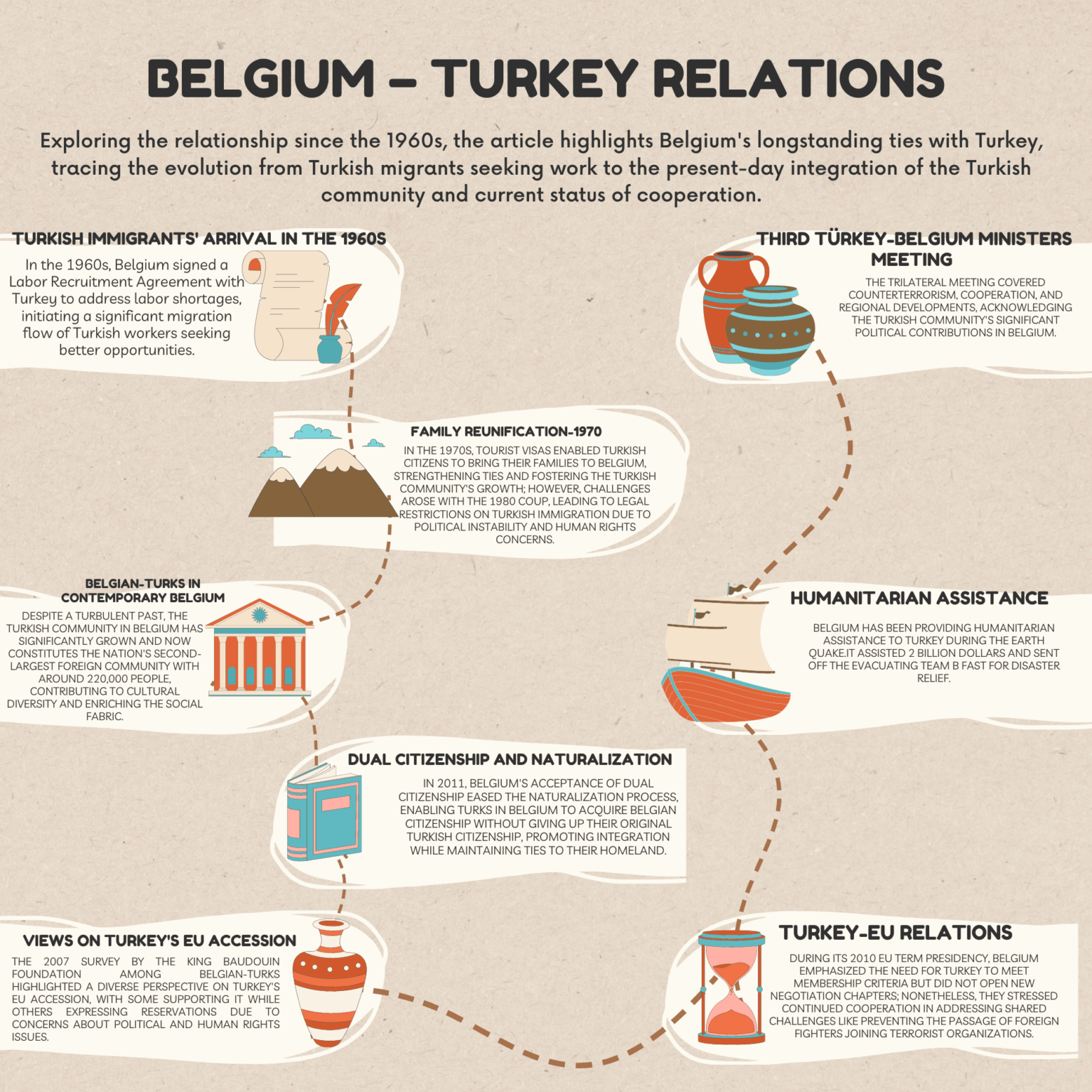Belgium Turkey International Relations
Belgium, a country with a rich history, has had a longstanding relationship with Turkey that dates
back to the 1960s. From the arrival of Turkish migrants seeking work opportunities to the
present-day integration of the Turkish community, this article explores the evolution of
Belgian-Turkish relations and sheds light on the current status of their cooperation.
Table of Contents
The Arrival of Turkish Migrants in the 1960s:
In the 1960s, Belgium faced labor shortages, and in response, the Belgian government signed a Labor
Recruitment Agreement with Turkey in July 1964. This agreement facilitated the organized arrival of
Turkish migrants to fill the gaps in the Belgian workforce. Turkish citizens seeking a better life and
employment opportunities ventured to Belgium, marking the beginning of a significant migration
flow that would shape the demographics of the country.
1970s: Family Reunification and Turbulent Bilateral Relations:
In the 1970s, Turkish citizens were granted tourist visas, allowing them to bring their families over to
Belgium. This move strengthened ties between the two nations and fostered the growth of the
Turkish community in Belgium. However, the relationship faced challenges with the 1980 coup in
Turkey. Political instability and human rights concerns led Belgian authorities to impose legal
restrictions on Turkish immigration, impacting the dynamics of the Turkish community in Belgium.
Belgian-Turks in Contemporary Belgium:
Despite the turbulent past, the Turkish community in Belgium has grown significantly over the years.
Currently, Turkish immigrants constitute Belgium’s second-largest foreign community, with
approximately 220,000 people. Their presence has contributed to the cultural diversity of the nation,
enriching its social fabric.
Dual Citizenship and Naturalization:
In 2011, Belgium officially accepted the concept of dual citizenship, making it easier for many Turks
living in Belgium to acquire Belgian citizenship without renouncing their original Turkish
citizenship. This step facilitated the naturalization process and allowed Turkish immigrants to fully
integrate into Belgian society while retaining their ties to their homeland.
Views on Turkey's EU Accession:
In 2007, the King Baudouin Foundation conducted a survey among Belgian-Turks to gauge their
views on Turkey’s EU accession process. The results revealed a varied perspective within the
community. While some supported Turkey’s bid for EU membership, others expressed reservations
due to concerns about political and human rights issues in Turkey.
Belgium's Role in Turkey-EU Relations:
During its rotating EU term presidency in 2010, Belgium emphasized the importance of Turkey
meeting all the membership criteria to progress in the accession process. However, no new chapters
were opened for negotiations during that time. Despite this, Belgian officials have stressed the
necessity of continued cooperation with Turkey in addressing common challenges, such as
preventing the passage of foreign fighters joining terrorist organizations.
Humanitarian assistance
Belgium has been providing humanitarian assistance to Turkey during the earth quake.it assisted 2
billion dollars and sent off the evacuating team B FAST for disaster relief.

Third Türkey-Belgium Ministers Meeting (Ankara, 9 March 2016):
The meeting involved the foreign affairs, justice, and interior ministers from both countries. It
marked the third trilateral meeting at ministerial level, with previous meetings held in 2008 and
2013. Discussions covered issues related to counterterrorism, judicial and police cooperation,
consular affairs, and regional and international developments.
The Turkish community in Belgium, consisting of approximately 220 thousand people, played a
crucial role in bilateral relations. They constitute the second largest foreigner group in Belgium.
Notably, 12 Belgians of Turkish origin were elected to various Belgian Parliaments in the 2014
elections, and some have held significant political positions, such as Emin Özkara as Deputy Speaker
of the Brussels-Capital region Parliament and Meyrem Almacı as leader of the Flemish Green Party.
Moreover, in the 2012 local elections, around 120 Belgians of Turkish origin were elected to
provincial councils, with Emir Kır becoming the first Belgian of Turkish origin to be elected as Mayor
of Saint-Josse municipality.
The bilateral trade
Turkey and Belgium reached 5.7 billion Dollars in 2015, with Türkiye exporting transportation
vehicles, textile products, metals, machines, vegetables, and fruits, and importing chemical and
related industrial products, plastics, rubber products, machines, iron-steel, electrical devices, and
parts. There have been substantial direct investments both ways, with Belgium investing 8.17 billion
Dollars in Türkiye and Türkiye investing 311 million Dollars in Belgium between 2002 and 2015.
Additionally, around 500 Belgian companies have been operating in Türkiye as of 2014.
Tourism
Around 620 thousand Belgian tourists visited Turkey in 2015, showcasing the appeal of Turkey as a
travel destination
